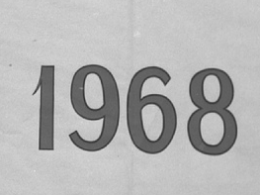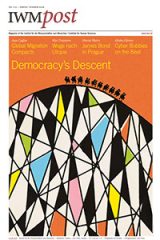

In collaboration with
Institute for Human Sciences
The Institute for Human Sciences / Institut für die Wissenschaften vom Menschen (IWM) is an independent institute for advanced study in the humanities and social sciences. Since its foundation in 1982, it has hosted more than 1500 scholars, journalists and translators from all over the world. Many of the Institute’s Permanent and Visiting Fellows are regular contributors to Eurozine or its focal points The World in Pieces and Ukraine in European Dialogue (see below).
Website: www.iwm.at
Twitter: @IWM_Vienna
Youtube: IWMVienna

Articles
How should the West react to Russia’s unrestrained pursuit of national interest? A policy of engagement defined as a focus on national interest, and a radical turn from value-based foreign policy to nineteenth century Realpolitik, is not a workable option for relations between Russia and the West, argues Ivan Krastev.

To Polish ears, the language of the Western revolutionaries of ’68 “carried the burden of oppression”, recalls Aleksander Smolar. Western ’68ers were often hostile to supporters of the Warsaw March revolt and indifferent towards the subsequent “anti-Zionist” purges. Yet the events were disastrous for Polish Jews at the time and are still relevant forty years later, writes Aleksander Smolar.

Mykola Riabchuk recalls how the politics of the Prague Spring filtered through to the Ukraine until the crackdown on ‘Ukrainian bourgeois nationalism’ in 1972-73; and how, during perestroika, the roles were reversed and he was able to bring banned literature to friends in Czechoslovakia.

Parallels between May ’68 and the Prague Spring are largely the result of the simultaneity of the events; in important respects, the political goals of the two movements were antithetical. Nevertheless, central European dissent had a significant impact on the French anti-totalitarian Left after 1968, argues Jacques Rupnik.
Focal points

Inspired by a lecture that Clifford Geertz delivered in 1995 at the Institute for Human Sciences in Vienna, this focal point engages with ‘deep diversity’, ‘a sense of dispersion, of particularity, of complexity and of uncenteredness’ rather than unified world order. It follows the launch of a research programme of the same name at the institute in January 2023.

Post-revolutionary Ukrainian society displays a unique mix of hope, enthusiasm, social creativity, collective trauma of war, radicalism and disillusionment. With the Maidan becoming history, the focal point ‘Ukraine in European Dialogue’ explores the new challenges facing the young democracy, its place in Europe, and the lessons it might offer for the future of the European project.
Projects and publications

